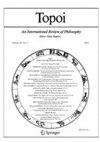Loneliness, Psychological Models, and Self-Estrangement
IF 1.3
2区 哲学
0 PHILOSOPHY
引用次数: 0
Abstract
Abstract Loneliness is often described as an experience that is about the absence of other people. But loneliness also has an important self-directed aspect: it is oneself one experiences as lonely. I begin by taking it that what the lonely person experiences as absent are not simply other people but rather certain kinds of social relationships with them. Loneliness then involves a disappointed self-relation, a form of estrangement from oneself. I substantiate this view by appeal to psychological model theory. Social agents operate with triadic models of their environments that they themselves, together with the other person and the environment, help constitute. Social models are formed on the basis of intersubjective interaction and enable the social agent to contribute to these interactions. Conceptually more sophisticated versions of social models are at play in the conduct of complex social relationships like friendships or partnerships. Participants in these relationships regulate their social activities by applying the model to concrete situations and then acting so as to adjust the social situation to the model they entertain of it. The self thus features twice in the social agent’s experience, as a participant in the interaction and as an observing and regulating perceiver. Loneliness is the result of one way in which social reality can fail to be in tune with the model the person has of it. It involves a discrepancy between the model of her social life, including her own role in it, and how she perceives that social life to be.孤独、心理模式与自我疏离
孤独通常被描述为一种缺乏他人的经历。但孤独也有一个重要的自我导向方面:一个人感到孤独的是自己。我首先认为孤独的人所经历的缺席不仅仅是其他人,而是与他们的某种社会关系。因此,孤独涉及一种失望的自我关系,一种与自己疏远的形式。我借助于心理模型理论来证实这一观点。社会行动者运用环境的三合一模型来运作,他们自己、其他人和环境一起帮助构建了这个模型。社会模式是在主体间互动的基础上形成的,并使社会主体能够为这些互动做出贡献。概念上更复杂的社会模型版本在复杂的社会关系(如友谊或伙伴关系)中发挥作用。这些关系中的参与者通过将模型应用于具体情况来调节他们的社会活动,然后采取行动,使社会情况适应他们所接受的模型。因此,自我在社会行为人的经验中有两个特点,一个是作为互动的参与者,另一个是作为观察和调节的感知者。孤独是社会现实无法与个人的模式协调一致的一种结果。这涉及到她的社会生活模式,包括她自己在其中扮演的角色,与她对社会生活的看法之间的差异。
本文章由计算机程序翻译,如有差异,请以英文原文为准。
求助全文
约1分钟内获得全文
求助全文
来源期刊

TOPOI-AN INTERNATIONAL REVIEW OF PHILOSOPHY
PHILOSOPHY-
CiteScore
3.10
自引率
7.10%
发文量
47
期刊介绍:
Topoi''s main assumption is that philosophy is a lively, provocative, delightful activity, which constantly challenges our received views, relentlessly questions our inherited habits, painstakingly elaborates on how things could be different, in other stories, in counterfactual situations, in alternative possible worlds. Whatever its ideology, whether with the intent of uncovering a truer structure of reality or of soothing our anxiety, of exposing myths or of following them through, the outcome of philosophical activity is always the destabilizing, unsettling generation of doubts, of objections, of criticisms. It follows that this activity is intrinsically a ''dialogue'', that philosophy is first and foremost philosophical discussion, that it requires bringing out conflicting points of view, paying careful, sympathetic attention to their structure, and using this dialectic to articulate one''s approach, to make it richer, more thoughtful, more open to variation and play. And it follows that the spirit which one brings to this activity must be one of tolerance, of always suspecting one''s own blindness and consequently looking with unbiased eye in every corner, without fearing to pass a (fallible) judgment on what is there but also without failing to show interest and respect. Topoi''s structure is a direct expression of this view. To maximize discussion, we devote most or all of this issue to a single topic. And, since discussion is only interesting when it is conducted seriously and responsibly, we usually request the collaboration of a guest-editor, an expert who will identify contributors and interact with them in a constructive way. Because we do not feel tied to any definite philosophical theme (or set of them), we choose the topic with absolute freedom, looking for what is blossoming and thriving, occasionally betting on what might - partly through our attention - ''begin'' to blossom and thrive. And because we do not want our structur e to become our own straightjacket, we are open to contributions not fitting the ''topos'', and do not rule out in principle the possibility of topic-less issues.
 求助内容:
求助内容: 应助结果提醒方式:
应助结果提醒方式:


